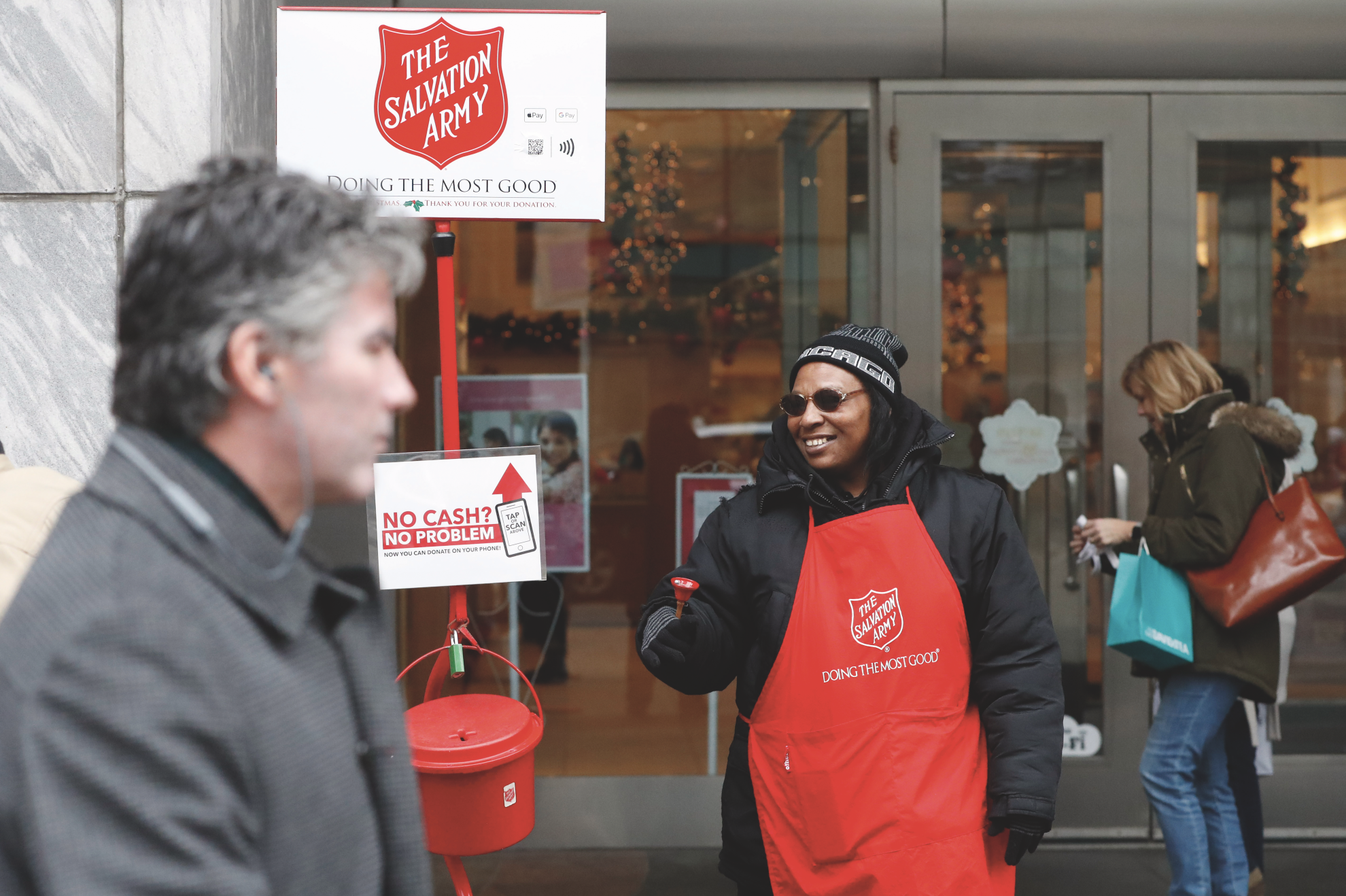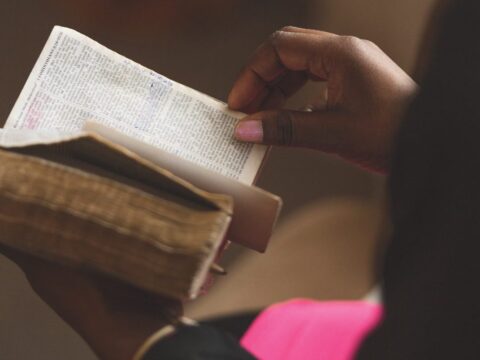Several years ago, I began bypassing the Salvation Army bell-ringers and stopped putting money in the ubiquitous red Christmas kettle, a holiday fixture in 2,000 stores and street corners across Canada.
Yes, the Salvation Army helps the poor by running food banks and offering emergency relief, addiction rehab, and clothing and shelter for people in need — and it’s been doing so in Canada since 1882. But it also has a long history of discriminating against the LGBTQ2 community.
Like many conservative organizations, the Salvation Army adheres to a theology that considers gay sex sinful. It has denounced marriage equality as a threat to religious freedom, vigorously fought against policies extending health benefits to same-sex partners and referred gay individuals to conversion therapy. In 1986, it campaigned to retain the criminalization of homosexuality in New Zealand. It eventually apologized 20 years later.
One of the most disturbing incidents was a 2012 Australian radio interview with a media spokesperson who said he agreed with Romans 1:18-32, which calls for homosexuals to be put to death. “That’s part of our belief system,” he stated. The Salvation Army later apologized for the comment, and the official was removed from his post.
And yet, I felt a twinge of conscience. My mother had been helped by the Salvation Army after my father left our family when I was three years old and my brother was just a baby.
There are social media memes about the church’s approach regarding the LGBTQ2 community. I decided to research one I had seen of two female bell-ringers posing with a sign that read “Gays Not Allowed.” Well, that’s a fabrication — a digitally altered version of a promotional photo that originally read “Doing the Most Good.” Similarly, a 2008 report that a trans woman died on the streets of Austin, Texas, after a Salvation Army shelter turned her away was also untrue.
More on Broadview:
- This Romanian adoptee found a loving community at a Victoria church
- How to take care of your mental health this winter
- Inside the fight for LGBTQ2 inclusion in evangelical churches
In 2013, the Salvation Army opened a “safety dorm” in a Las Vegas shelter exclusively for transgender individuals. In San Francisco, it operates a detox facility that helps those infected with HIV-AIDS. In Baltimore, it provides direct services to transgender people who are survivors of human trafficking. And two years ago, the Salvation Army in Winnipeg opened a new space for homeless LGBTQ2 people.
The Salvation Army international website states that it “stands against homophobia, which victimises people and can reinforce feelings of alienation, loneliness and despair.” The American website notes that four out of 10 homeless youth identify as LGBTQ2 and that almost a third of homeless transgender people have experienced being rejected from an emergency shelter.
Last December, San Francisco’s Bay Area Reporter ran a positive piece about the organization’s work, quoting city official Rafael Mandelman, who said, “I do not, as a gay man, love its positions on same-sex marriage, but the reality is the Salvation Army is one of the most important providers of substance use treatment and shelter to homeless folks.… Many, many queer people have turned their lives around with the help of the Salvation Army.”
Wayne Besen, the founder of Truth Wins Out, an advocacy group working to end “ex-gay” conversion programs, is not convinced, however. In a 2016 opinion piece in the Huffington Post, he wrote, “The Salvation Army can’t afford to be viewed as a backward and bigoted organization, because it would cost them a significant amount of money. Their reputation would take a severe hit, tarnishing their brand, particularly among youth who are repulsed by anti-gay propaganda.”
The Salvation Army should apologize to LGBTQ2 people.
The Salvation Army insists it’s not anti-LGBTQ2, but can you really be against same-sex marriage, and insist on abstinence for gays, and make this claim? I don’t think so. I agree with Besen, who urges the Salvation Army to decide whether it’s an “organization that supports equality or… believe[s] that homosexuality is a sickness that can be cured. They can’t have it both ways.”
The Salvation Army should issue an apology for the harm it has done to the LGBTQ2 community. Still, I’ve come to believe that its actions trump its theology. Programs for people living in poverty, including LGBTQ2 folks, should not run the risk of being eliminated because one disagrees with the views of those who provide such services. Little would be gained for those most in need if this were to happen. Last year, the Salvation Army assisted 1.6 million Canadians in 400 communities across Canada, including providing food hampers to 260,000 at Christmas.
Recently, I asked my 76-year-old mother about the help she received from the Salvation Army all those years ago. She told me they gave her a cheque for $50 at Christmas for four years in a row. During those years, my mom lived on welfare and didn’t have a car, a television set, a telephone or even a bank account. She used that $50 to buy presents for me and my brother, to get a small tree and Christmas decorations, and to add some special food items to her grocery list around the holidays. In the decades since she received this assistance, she has donated several hundred dollars every year to the Salvation Army. “They helped me out when I needed it most, so I feel strongly about helping them out,” she says.
I wouldn’t go out of my way to write a cheque to the Salvation Army, but I’m not going to smugly walk by the red kettle any longer. My measly $5 or $10 is just a drop in the bucket, but I’ll feel like a grinch if I don’t give at least a little. Studies show that a personal connection to a charity is a major factor in donating. More than half a century ago, the Salvation Army made Christmas a little merrier for our family. The least I can do now is return the favour.
Anne Bokma is a journalist and the author of the memoir My Year of Living Spiritually: One Woman’s Quest for a More Soulful Life.
We hope you found this Broadview article engaging.
Our team is working hard to bring you more independent, award-winning journalism. But Broadview is a nonprofit and these are tough times for magazines. Please consider supporting our work. There are a number of ways to do so:
- Subscribe to our magazine and you’ll receive intelligent, timely stories and perspectives delivered to your home 10 times a year.
- Donate to our Friends Fund.
- Give the gift of Broadview to someone special in your life and make a difference!
Thank you for being such wonderful readers.
Jocelyn Bell
Editor/Publisher
















I don’t know what a “long history” means to you, but the gay rights movement of today slowly started in the 1940’s and seriously became a force in the 70’s.
Because a denomination has a Biblical interpretive view of something, you automatically consider it discriminatory. At least (from your own words) they made an attempt not to be harsh on other cultural views, but haven’t compromised their position.
BTW Romans 1: 18-32 does not state homosexuals should be put to death, rather its meaning (v. 32) is the judgment of God (both present and future) is on those who practice the sins mentioned. (I don’t think it’s strange that Aids and STD are largely a result of the sexual revolution.)
I’m glad your research has found that views of “Christian” conservative had revealed urban myths. I sure wish others would put the effort into doing so. The conservative (as well as the liberal) churches have done a great work for society as a whole. However, you jumped in and agreed that the Salvation Army declares homosexuality as a sickness, It does not. It declares it a sin from those of a depraved (deviating from what is considered moral or right or proper or good) mind. (Romans 1:28)
You just (ironically) made the point of why The Sally is so theologically problematic.
I beg to differ, they have Biblical stance on a worldly issue, and still find the compassion to show Christ love in spite of it. Much like the Good Samaritan.
Aside from the typical “God is Love”, what would make the Salvation Army’s theology correct?
I can identify with your article. A number of years ago, I was a struggling church musician with a wife who had large medical bills and financial ends just were not meeting. I stopped by The Salvation Army before Christmas and filled out an “application” for a Christmas hamper, making it clear I was an underpaid musician at a competing faith body. No matter: they gave me a hamper, with a smile, and it was a blessing to receive. I do wish they would clear up their theology, but they take Jesus seriously in helping others and I believe they have been blessed in return.
Everyone and every organization has good points and bad points. It is unfair to judge the whole by cherry-picking a few of the parts. The whole cancel culture is based on this agenda. If, on balance, the person is found wanting, so be it, but the Christian response should be redemption, not damnation. The United Church itself has a past that would not stand much scrutiny by today’s standards
An important distinction is missing here. The Salvation Army is both a church, and a charitable organization. Members of the church have a right to any theology they want. Our charitable dollars do not go to the church, which is self-supporting.
Our charitable dollars go to a charitable organization which never fails to show up when a crisis happens, there is a fire, an earthquake, a disaster small or large. Our workplaces and neighbourhoods are filled with people who found recovery and joy through Salvation Army recovery centres.
A couple of winters ago, on a night that turned out to be the coldest of the year, I was giving a tour of shelters in our City to members of a Board. Took them to the 100 block east Cordova where the Salvation Army runs several shelters, and a large Harbourlight with a halfway house, a detox for men and one for women, a live-in recovery, a giant kitchen and cafeteria, and permanent housing for men in recovery. Everything was squeaky clean. It was warm, bright, calm and comfortable. All the shelter beds were occupied. Mats with pillows and blankets had been placed on every bit of horizontal space. By the time we left, every mat was occupied. Everyone who came in had been fed. They were all exhausted. Lights were lowered. We spoke at some length with the staff. We asked their policy about trans people. We were told “If they identify as men, they go to the men’s shelter. If they identify as women, they go to the women’s shelter.” We asked the staff why they were so happy, working overnight. One after another, they said they had each first come to the Salvation army for a mat to sleep on in their addiction. Had found recovery through Salvation Army programs. And were so happy because now they were able to give back the kindness that was given to them.
We counted. The Salvation Army had over 450 people sleeping in their facilities on one city block that night. If the Salvation Army was not there, most of their guests would have been sleeping on the freezing cement outside.
I’m completely comfortable giving generously to the Salvation Army.
Some of us have been struggling to overcome homophobia and transphobia in Christian denominations for many years. The Salvation Army is not exempt from the teachings and inclusive ministry of Jesus.
The church should sit down with LGBTI leaders and apologise. “When an organization has had a negative history with the community, it’s the responsibility of that organization to change the perception within the community, and I’m not feeling like the Salvation Army has done that,” said Mike Tutthill, executive director of the Rainbow Resource Centre, a non-profit organization that serves the LGBT community in Manitoba and Northwestern Ontario.
https://www.cbc.ca/news/canada/manitoba/new-lgbt-shelter-salvation-army-winnipeg-1.4511073
The Sally Anne is nothing without its donors. The donors could easily find an organization (or a hundred) who are not bigoted and that promote equity while providing needed services and supports. It is a false dichotomy to think: support the Sally’s bigotry or people suffer from your withdrawal.
The Sally is nothing without the donors. There are tons of places one can give that are not bigoted and prejudiced. It is a false dichotomy to say give to the Sally or be a smug Grinch. I expect more thoughtful analysis from Broadview.
What people or an Org. say about God is NOT GOD.
What people or an Org. do reflects God in their life as LOVE SPIRIT.
Presence one to another- Life flowing one to another.
If I nsist that you MUST believe as you do , then we are setting our words about God as an idol. That’s true for “Conservatives” or “Liberals” .
My question for you is “How is God revealed?”
“In the beginning was the Word…the Word became flesh…”
Fortunately we have the Bible “the Word”, “this is the message we have heard from Him and proclaim to you, that God is light, and in Him is no darkness at all.”
“This is love: not that we loved God, but that He loved us and sent His Son as an atoning sacrifice for our sins.” “And have mercy on those who doubt; save others by snatching them out of the fire; to others show mercy with fear, hating even the garment stained by the flesh.”
“That all of them may be one, as You, Father, are in Me, and I am in You. May they also be in Us, so that the world may believe that You sent Me. I have given them the glory You gave Me, so that they may be one as We are one—”
My next question: “How is Christ and God one?”
“Nevertheless, the one who receives instruction in the word must share in all good things with his instructor. Do not be deceived: God is not to be mocked. Whatever a man sows, he will reap in return. The one who sows to please his flesh, from the flesh will reap destruction; but the one who sows to please the Spirit, from the Spirit will reap eternal life.…”
I believe as I do by the setting of God’s Word, this is true for anyone, regardless if they are “Conservative or Liberal”.
I love your position.
Honest article, there is no doubt that SA does good work. The problem is that the majority of people within the SA (and many other Conservative Christian groups) have a pre critical view of the Bible and the majority of people within groups like the UCC have a post critical view. There are + and – in each. The post critical folks are probably more true to modern knowledge related to what we now know about the Bible and the world. However, they are less true to follow this knowledge to its logical conclusion related to faith – a non-traditional Biblical worldview (and hence non-traditional Christian view or no Christian view at all) including no: Trinity, virgin birth, miracles (from supernatural sources), God (as traditionally conceived), Jesus as God, Bible as divinely inspired or being any more special than any other book, sin and other traditional Christian theological ideas. Groups like SA are very consistent with their traditional Christian beliefs and either don’t know or don’t consider the serious issues raised by modern knowledge to their views. Both groups are trying to be true to their knowledge and beliefs. The SA holds to a more traditional (Chalcedonian) view of Christianity and the other groups a redefined view of Christianity. Since there has always been many different forms of Christianity, this is reasonable. If you hold to a Chalcedonian view you pretty much have to agree with the SA’s view on LGBTQ2. Otherwise you can believe whatever you want.
I would disagree with your comment: “The post critical folks are probably more true to modern knowledge related to what we now know about the Bible and the world.”
Perhaps “more accepting related to the world and its knowledge” would be accurate. If one has a critical view of a topic, they would need to know the pros and cons of the topic involved. I find it interesting that the UCC claims that they use Scriptures (what we call the Bible) to support their faith position. Yet, when they make a stance for their beliefs, Scripture support is almost always lacking. However, I’m sure most, if not all UCC leaders and congregants would agree with the Chalcedonian view, but they still believe whatever they want.
I agree with you Gary that groups like the UCC do try to have it both ways. Use post critical knowledge but then try to imply some sort of scriptural support to give their ideas extra authority. I know they would probably say their arguments are following some sort of metaphorical structure and are not meant to be taken literally. However, this is not always clear from the context. It also begs the question of why discuss ideas and facts in language that just obscures what is discussed. Either state the ideas and facts to debate within a context that assumes a traditional view of the Bible (divinely inspired, authoritative , comprehensive and perhaps even inerrant etc.) or within a post critical scientific context assuming that the Bible is just another book with significant shortcomings, mistakes and myths like any other ancient book. I doubt that most UCC leaders would hold Chalcedonian views in practice since much of their training and education is post critical and therefore doesn’t accept these ideas. Also, virtually all of the major scholars of this tradition and other major Christian groups (such as Lutheran, Anglican, Presbyterian and Catholic) would hold post critical views and therefore not agree with many Chalcedonian views in practice. Again, this is because most of these leaders and scholars have been educated in higher criticism of the Bible (approaching what the Bible says, claims, records and discusses in a way that does not assume it is any different than any other book (or at least significantly different such as being inerrant). Higher criticism applies critical methods to the Bible as it would to analyzing the structure, accuracy, content and claims of any ancient book.).
As a follow on to what I said above. At least some Christians (Chalcedonian) can be loving toward people (such as LGBTQ2) but have a problem with what they view as their sin – as the example of the SA demonstrate. Also, most LGBTQ2 and non-traditional Christians (non-Chalcedonian) are not profligate sinners, who desire to corrupt and destroy all of society as some traditional Christians might think. Most are just trying to get through life like their fellow traditional Christians. Both groups, like most human groups, have biases and incorrect/incomplete ideas of the other. Demonizing and drawing simple stereotypes of the other is not only incorrect, it can be very dangerous. I appreciated the author’s honesty in confronting her biases and trying to do something about them. This is the point of her article and what we all need to seriously confront in ourselves rather than criticizing someone or some group.
The main useful point of the article, however, is that we all have biases. I appreciate the author admitting hers. As long as we don’t take this recognition as something we possess that others or other groups don’t, which somehow make us superior, than it can be useful to better ourselves. At the end of the day, whether we are LGBTQ2 or not, whether we are traditional Christian or not, and no matter who we are – all of us are just trying to get through life the best we can. Perhaps we should just leave it at that.
Although I like your suggestion, (trust me it would be good for a lot of people I know and care for) but it’s flawed. Christ not only claimed to be God, but proved it. He claimed He was the only way to heaven John 14:6, therefore we need to ask “Did Jesus speak the truth or not?”
Peter His disciple thought Jesus spoke the truth in Acts 4:10-12.
If we rebel against God, we are then saying “We are better than God.” There is NOTHING that I did to deserve God’s promise to me. I am no better than others, but I have received a covenant promise from God that I will be in heaven because my faith and hope is; Jesus is God and He paid the penalty for my sins. I was and I am still incapable of “paying my way to heaven”. My zeal and passion for my faith can sometimes come across as self-centered, but conformity with the world will not win others for Christ. Jesus is the ONLY way we can get through life better than we can, because our “best” will never be good enough.
I am disappointed to find this article in Broadview. The Salvation Army hides its homophobia and transphobia behind a façade of charitable works. It is not worthy of the support of 2SLGBTIQ+ people–or of this magazine.
I am a Christian. I believe homosexuality is a sin.
I grew up in a Salvation Army environment.
I believe Christians should love and treat gay people exactly the same as all people, but never suggest that their sin is God’s will for their lives.
If the Salvation Army ever suggests that homosexuality is not a sin, I will not support their
ministry in any manner.
God’s word always, above human feelings.